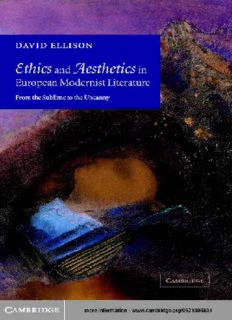
Ethics and Aesthetics in European Modernist Literature: From the Sublime to the Uncanny PDF
Preview Ethics and Aesthetics in European Modernist Literature: From the Sublime to the Uncanny
This page intentionally left blank ETHICS AND AESTHETICS IN EUROPEAN MODERNIST LITERATURE DavidEllison’sbookisaninvestigationintothehistoricaloriginsand textual practice of European literary Modernism. Ellison’s study tracestheoriginsofModernismtotheemergenceofearlyGerman RomanticismfromthephilosophyofImmanuelKant,andempha- sizes how the passage from Romanticism to Modernism can be followedinthegradualtransitionfromthesublimetotheuncanny. ArguingthatwhatwecallhighModernismcannotbereducedto a religion of beauty, an experimentation with narrative form, or evenareflectionontimeandconsciousness,Ellisondemonstrates thatModernisttextualityischaracterizedbytheintersection,over- lapping, and crossing of aesthetic and ethical issues. Beauty and morality relate to each other as antagonists struggling for domi- nance within the related fields of philosophy and theory on the one hand (Kant, Kierkegaard, Nietzsche, Freud) and imaginative literature on the other (Baudelaire, Proust, Gide, Conrad, Woolf, Kafka). DAVID ELLISON is Professor of French and Comparative Litera- tureandChairmanoftheDepartmentofForeignLanguagesand LiteraturesattheUniversityofMiami(Florida).Heistheauthor ofTheReadingofProust(),UnderstandingAlbertCamus(),and OfWordsandtheWorld:ReferentialAnxietyinContemporaryFrenchFiction (). ETHICS AND AESTHETICS IN EUROPEAN MODERNIST LITERATURE From the Sublime to the Uncanny DAVID ELLISON UniversityofMiami The Pitt Building, Trumpington Street, Cambridge, United Kingdom The Edinburgh Building, Cambridge CB2 2RU, UK 40 West 20th Street, New York, NY 10011-4211, USA 477 Williamstown Road, Port Melbourne, VIC 3207, Australia Ruiz de Alarcón 13, 28014 Madrid, Spain Dock House, The Waterfront, Cape Town 8001, South Africa http://www.cambridge.org ©David Ellison 2004 First published in printed format 2001 ISBN 0-511-02903-9 eBook (Adobe Reader) ISBN 0-521-80680-1 hardback Kierkegaardfacestheproblem,whethertoenjoylifeaesthetically ortoexperienceitethically.Butthisseemstomeafalsestatement of the problem. The Either-Or exists only in the head of Søren Kierkegaard. In reality one can only achieve an aesthetic enjoy- mentoflifeasaresultofhumbleethicalexperience.Butthisisonly apersonalopinionofthemoment,whichperhapsIshallabandon aftercloserinquiry. FranzKafka(quotedbyGustavJanouchinConversationswithKafka) ForEllen,inthewordsofthepoet Ichhattesniesoganzerfahren,jenesaltefesteSchicksalswort,daß eineneueSeligkeitdemHerzenaufgeht,wennesausha¨ltunddie MitternachtdesGramsdurchduldet,unddaß,wieNachtigallgesang imDunklen,go¨ttlicherstintiefemLeiddasLebensliedderWeltunsto¨nt. Contents Preface pageix Listofabbreviations xiii PART ONE KANT, ROMANTIC IRONY, UNHEIMLICHKEIT BordercrossingsinKant Kierkegaard:ontheeconomicsoflivingpoetically Freud’s“DasUnheimliche”:theintricaciesoftextual uncanniness PART TWO THE ROMANTIC HERITAGE AND MODERNIST FICTION Aestheticredemption:thethyrsusinNietzsche,Baudelaire, andWagner The “beautiful soul”: Alain-Fournier’s Le Grand Meaulnes andtheaestheticsofRomanticism ProustandKafka:uncannynarrativeopenings Textualizingimmoralism:Conrad’sHeartofDarkness andGide’sL’Immoraliste Fishingthewatersofimpersonality:VirginiaWoolf’s TotheLighthouse EPILOGUE:NarrativeandmusicinKafkaandBlanchot: the“singing”of Josefine Notes Workscited Index vii
Description: